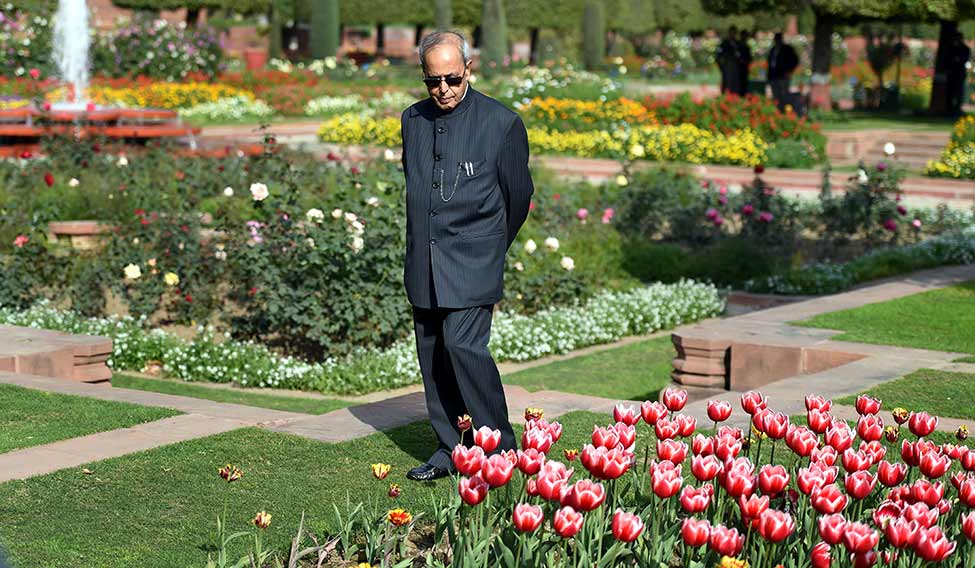The results of the assembly elections in five states will arrive on March 11. And they will initiate hectic parleys and calculations to choose India’s 14th president. To send its nominee to the Rashtrapati Bhavan, the BJP needs to score a comprehensive victory in Uttar Pradesh, and do well in other states.
By zeroing in on a retirement home for President Pranab Mukherjee, whose tenure gets over in July, the government has signalled that it is keen on sending someone from its own ideological family to occupy the top constitutional office. Mukherjee won the election in July 2012 by getting 7,13,763 votes, more than double the number his rival, former Lok Sabha speaker P.A. Sangma, polled.
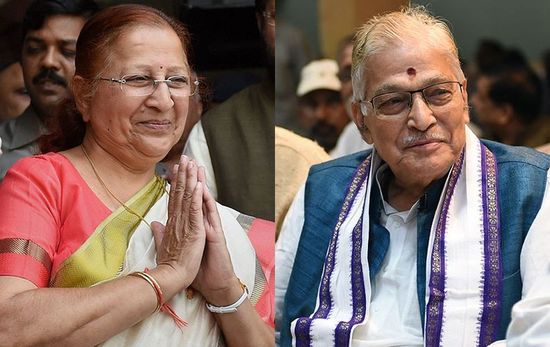 The big contenders: Sumitra Mahajan and Murli Manohar Joshi | Aayush Goel, PTI
The big contenders: Sumitra Mahajan and Murli Manohar Joshi | Aayush Goel, PTI
“Things will be clear after the [assembly poll] results in five states, especially Uttar Pradesh,” a Union minister told THE WEEK. According to the minister, it was too early to predict the outcome of the presidential election, as the BJP is still more than 70,000 votes short of majority.
The president is chosen by an electoral college of MPs and legislators in states. The election is held in accordance with the system of proportional representation, in which population figures and the number of assembly seats of states play a role in determining the value of each vote of the electoral college (see graphics). In Uttar Pradesh, for instance, 403 MLAs have a combined 83,824 votes.
“After the results are declared, the people of Uttar Pradesh, Uttarakhand and Goa would have spoken and given a clear mandate to the BJP,” said Meenakshi Lekhi, MP and BJP spokesperson. “The party is confident of getting its candidate elected as the next president.”
Irrespective of the poll results, efforts are on to challenge the BJP’s presidential nominee. Bihar Chief Minister Nitish Kumar has met several opposition leaders to explore the possibility of fielding a joint candidate. “Nitishji met Left leaders Sitaram Yechury and D. Raja, Nationalist Congress Party leader Praful Patel and [Biju Janata Dal leader and Odisha Chief Minister] Naveen Patnaik to field a non-BJP candidate in the presidential poll,” K.C. Tyagi, Janata Dal (United) spokesman, told THE WEEK. “Even if the BJP gets the numbers, we would oppose it.”
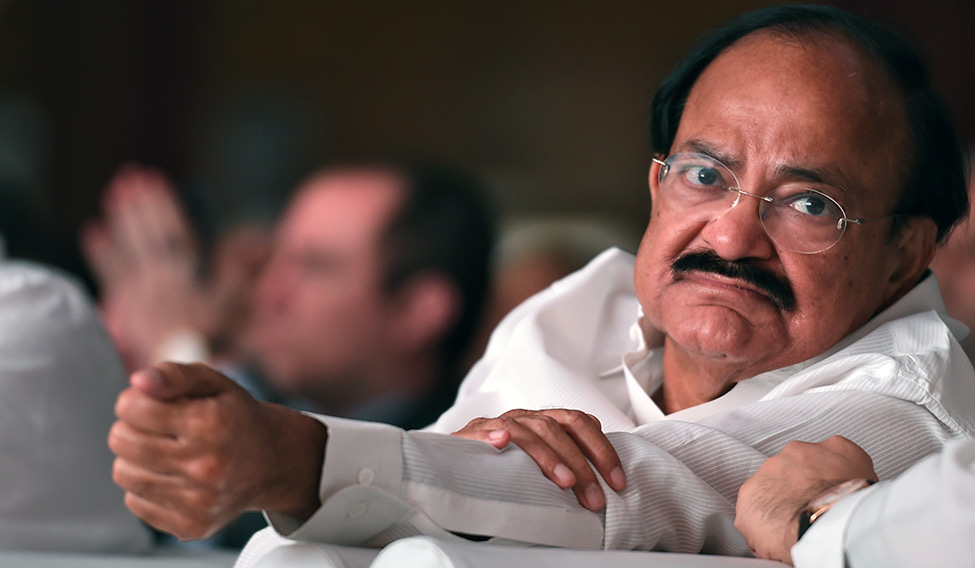 Union Minister Venkaiah Naidu | Aayush Goel
Union Minister Venkaiah Naidu | Aayush Goel
Sources said that other opposition parties such as the Trinamool Congress, the Samajwadi Party and the Aam Aadmi Party are likely to support the plan to field a joint candidate against the BJP nominee.
The BJP has been holding talks with not only its allies, but also regional parties that have a good number of votes. Top BJP leaders said they were hopeful of getting the numbers even if UP does not provide it with enough MLAs.
“One thing is clear: the next president will be from our ideological family, someone with an RSS background,” said a BJP MP. According to the MP, the final call on the candidate will be taken by Prime Minister Narendra Modi.
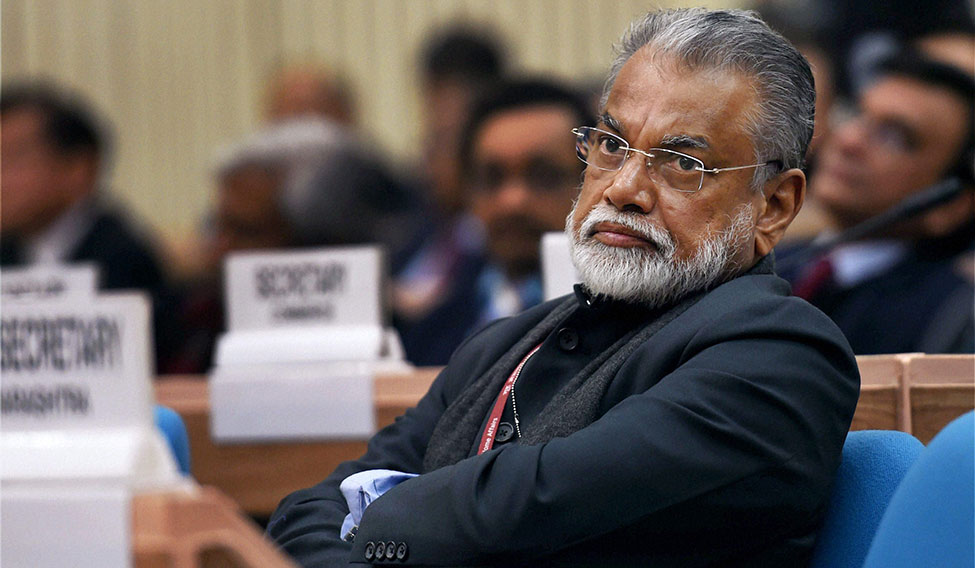 Former ISRO chairman K. Radhakrishnan | PTI
Former ISRO chairman K. Radhakrishnan | PTI
Apparently, Modi would prefer a “political person” who would not overshadow him in public appeal. Loyalty would be a guiding factor. Some of the names doing the rounds are Lok Sabha Speaker Sumitra Mahajan, Lok Sabha member and former HRD minister Murli Manohar Joshi, Urban Development Minister Venkaiah Naidu, tribal leader and Jharkhand Governor Draupadi Murmu, and dalit leader and Social Welfare Minister Thawar Chand Gehlot.
The buzz is that Mahajan, 73, has emerged as the frontrunner because of her contribution in removing hurdles for the BJP in the Lok Sabha. An eight-time MP, Mahajan has a clean record and is close to the RSS. Though some opposition parties have expressed their concern over her perceived pro-government stance, she has had a controversy-free stint.
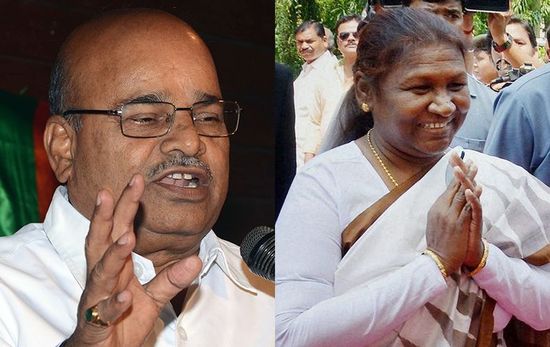 Jharkhand Governor Draupadi Murmu and Union Minister Thawar Chand Gehlot
Jharkhand Governor Draupadi Murmu and Union Minister Thawar Chand Gehlot
Naidu, who was parliamentary affairs minister, has been the government’s point man in holding talks with other parties. He has been effusive in praising Modi and vigorous in defending him. Though he no longer holds the parliamentary affairs portfolio, he is often involved in parleys with the opposition and in firefighting on behalf of the government. At 67, he is senior to Modi by just a year.
Naidu was earlier considered close to veteran party leader L.K. Advani, but he shifted his loyalty to Modi. Some of his party colleagues may oppose his nomination. There are suggestions that he be considered for vice president.
A section of the RSS is backing Joshi, 83. “But the question is whether Modi would agree,” said an RSS leader. Before the Lok Sabha elections in 2014, Joshi had vacated the Varanasi Lok Sabha seat for Modi. He was not as vocal as Advani and Sushma Swaraj had been in opposing Modi’s elevation as the BJP’s prime minister candidate in 2013.
A Brahmin, Joshi is seen as the face of the upper caste, the BJP’s core vote base. During his tenure as HRD minister in the Vajpayee government, he had pushed the RSS agenda by introducing a “nationalistic” perspective into the curriculum, which the opposition had decried as saffronisation.
That Joshi received the Padma Vibhushan this year is being viewed as the BJP’s compensation for not considering him as the party’s presidential candidate. His poor health has also been cited as a factor that could mar his chances. The same could work against both Advani and Swaraj.
At 89, Advani remains active and is not keen on retiring. But the fact that he had voiced his opposition to Modi and Amit Shah taking control of the BJP could work against him. The BJP’s defeat in the Bihar assembly elections in 2015 had Advani, Joshi and former Union minister Yashwant Sinha questioning the manner in which the party was being run.
Swaraj has all the qualifications required to become president, but the fact she had voiced her opposition to Modi earlier has dimmed her chances. As external affairs minister, she has been one of the better performers in the Modi cabinet, even as she let him hog the limelight abroad. While her interactions on social media have earned her praise, the possibility that she could take the focus away from Modi if she becomes president is considered a disadvantage.
Gehlot and Murmu are being considered with an eye on sending out a message to dalits and tribals before the 2019 Lok Sabha elections. Both the leaders have been doing their work and keeping a low profile, which suits Modi’s style of functioning.
In the past three years, Modi has made it evident that he is politically farsighted. His government has been reaching out to parties outside the National Democratic Alliance, even those who are constituents of the Congress-led United Progressive Alliance. That NCP chief Sharad Pawar received the Padma Vibhushan this year suggests that he may play ball if the BJP asks for his support in the presidential election.
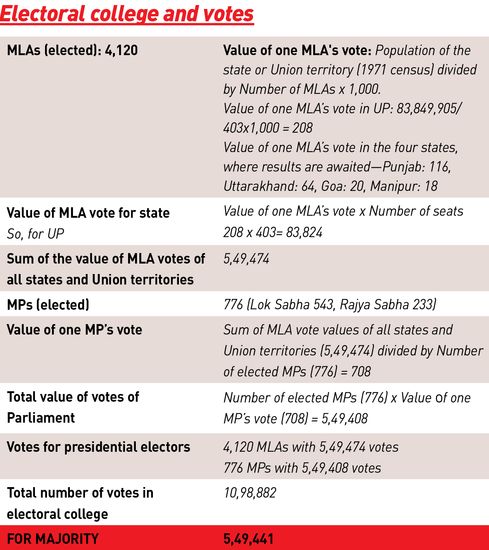
The Modi government’s support to Telangana Chief Minister K. Chandrasekhar Rao had helped it win a crucial ally during the demonetisation drive. Apparently, the gamble the BJP took in Tamil Nadu by supporting former chief minister O. Panneerselvam in the power struggle that followed AIADMK chief Jayalalithaa’s death was based on the calculation that he would support its presidential candidate. Though the BJP lost that gamble, it has not burnt its bridges with AIADMK general secretary Sasikala.
Patnaik’s Biju Janata Dal has not been actively supporting the non-NDA group inside Parliament. In fact, it has backed the Modi government on key issues such as demonetisation, which signals that the relationship between the two parties remains cordial. But the question is whether Patnaik would continue to support the BJP, which has emerged as the BJD’s main opposition after the recent municipal polls in Odisha.
In Maharashtra, the BJP has kept its recalcitrant ally, the Shiv Sena, on its side by announcing that it would not contest the mayoral poll in Mumbai, clearing the decks for the Sena candidate. The Shiv Sena’s support in the presidential election would be crucial for the BJP.
The Vajpayee government had proposed A.P.J. Abdul Kalam for president in 2002, as it did not have the support to ensure the victory of a candidate on its own. Kalam was subsequently elected president with the support of the Congress.
If the BJP fails to get the numbers this time around, it would mean a repeat of 2002. It is in this background that the names of nonpolitical persons such as E. Sreedharan, former managing director of Delhi Metro Rail Corporation Ltd, and K. Radhakrishnan, former chairman of the Indian Space Research Organisation, are being discussed. Radhakrishnan has shared the dais with RSS chief Mohan Bhagwat several times and is associated with Vijnana Bharati, an RSS-backed organisation that promotes science.
For the moment, though, the BJP is eagerly awaiting the results of the UP elections. “We are totally focusing on it,” said Anil Baluni, BJP spokesperson. “Only after the results are announced would the party focus on any other issue, including presidential election.”



